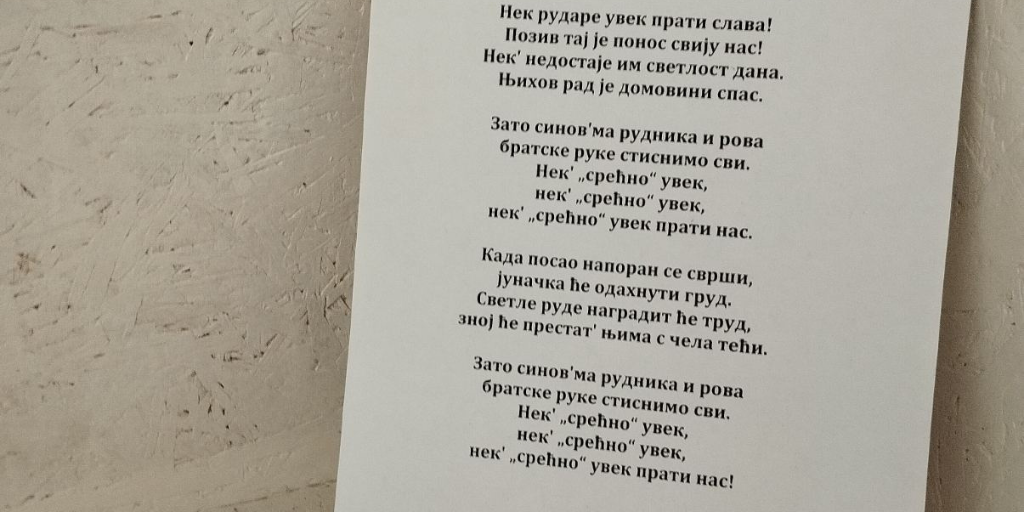Serbia’s underground coal mining regions, burdened by pollution and ancient technology, face an uncertain future, as plans to replace coal with fossil gas risk a new lock-in of unsustainable energy and distract authorities from unlocking the region’s untapped potential in agriculture, tourism, and green industries.
Nevena Smilevska , Just Transition Coordinator for the Western Balkans | 2 December 2024

Text of the mining hymn in Serbian
Miners work hard, but coal mining is digging the region into debt
In November 2024, Bankwatch visited the Despotovac and Zaječar regions in Serbia, where most of its underground coal mines are located. The mining company PEU Resavica receives three times more of its annual income from state subsidies than from sales — approximately EUR 47 million EUR in subsidies and EUR 15 million in sales. This region should therefore be the first to start the transition beyond coal. However, our meetings with municipalities, mine officials and trade union representatives showed that this region is not at all ready to move to a new economy.
Despite being heavily in debt, the mines have yet to be modernised. Mining company representatives are visibly proud of their continued operation since 1830. However, they said they still mine similarly as they did in the beginning – ‘like in Snow White and the seven dwarfs, with pickaxes’.
Despite the use of ancient technology, the region is proud to have never stopped coal production in some of the mines, and a mining museum in Senjski rudnik showcasing this history. Visitors can see the tools and the safety equipment that was used for underground mining over the years and a photo exhibition highlighting how much the local culture has been shaped by the mine. The region is so connected with coal mining that even the local restaurant has a mining-related logo and serves an ‘authentic Sunday lunch in a miner’s house’.

Agricultural potential underused
Not everyone is happy with having the mine there, though. The municipality of Despotovac hosts the main offices of the mining company and is among the more developed municipalities. However, they do not receive concession fees from coal mining, and are also unable to collect taxes, as the mine’s bank account has been frozen for years. While the local authorities are acknowledging that some of their residents are employed at the mine, thus preventing labour migration, they would prefer to have a more diversified economy.
Despotovac has good but underutilised agricultural potential. Farming subsidies are available, but the local authorities are not satisfied with their usage rate. The municipality also offers subsidies for improving the energy efficiency of households, with 40 successful applications in the most recent round. Rural tourism also has significant potential and although the number of related businesses is increasing, there is still a lot of room for further development. The local development strategy until 2030 is rather broad and its implementation is dependent on national decisions and on the nearby town of Jagodina which is not very cooperative and does not prioritise support for the region.
Air polluted, but keeping the mine afloat
In Zaječar, a town close to the Bulgarian border, the story is very different. Because Zaječar is larger than Despotovac, it is less dependent on the mines, except for heating, which relies heavily on coal. The local district heating system has been privatised, and many households have disconnected because of the high prices. However, with limited options and support schemes, they use cheap, locally sourced lignite from one of the underground mines at Lubnica, which keeps the Lubnica mine open – supporting around 300 workers and the entire village. This can be seen and felt in the appallingly polluted air. If coal was not sold to heat homes in Zaječar, there would be no market for its lignite and the mine would have to close.
At a meeting with the mining company, company officials complained about the difficulty of finding workers, saying that the average age of new employees is 35 and that young people – understandably –don’t want to work in a mine. The mine’s small size prevents the use of modern techniques, so they use pickaxes, in three shifts, 24/7, just to make sure the mines can stay open, and the tunnels do not collapse.
Switching to gas will just create new dependence
The region’s economy is not entirely dependent on the coal from the underground mines, but there are currently few activities leading to greater independence. On the contrary, the local authorities are looking forward to replacing the region’s dependence on one fossil fuel with another – gas.
The fossil gas network already reaches the nearby town of Paraćin, but an additional pipeline would have to be built to Zaječar. While they wait for another fossil fuel that will create new dependence, they are only prolonging their air pollution agony. The company and the local authorities, although aware that the introduction of gas for household heating will lead to the abrupt closure of the mine, are not taking any action to mitigate the socio-economic impacts.
This transition to a new fossil fuel will require another transition to a decarbonised heat source in the near future, which is totally unrealistic. The region that is already struggling to diversify its economic activities, and gas is distracting the authorities from this task.
The way forward to a just transition
The workers in the inevitably dying coal industry need to be supported and enabled to continue contributing to the development of the region. Their knowledge and expertise can be used to create and expand the economy and the social well-being of citizens in the region — it just takes an innovative approach to finding uses for their skills.
Eastern Serbia, as well as the entire Western Balkans, has huge potential for agriculture, crafts, rural tourism, but also important potential for green jobs in renewable energy deployment, energy efficiency retrofits and the circular economy. Looking to the future, we could see regions that are much more developed, offering not only the same, but a much better quality of life. Creative use of the opportunities offered by just transition may be the kick-start we need to make this future a reality.
Never miss an update
We expose the risks of international public finance and bring critical updates from the ground – straight to your inbox.
Theme: Just transition
Project: Just transition
